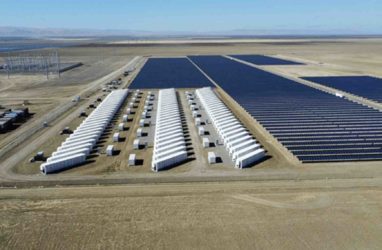Feed aggregator
UK sets “shining example” for 2035 targets as COP29 gathers pace. Will Australia match its ambition?
The post UK sets “shining example” for 2035 targets as COP29 gathers pace. Will Australia match its ambition? appeared first on RenewEconomy.
Losses mount for carbon credit financier after it writes off two more projects
Andrew Forrest takes aim at Woodside and Exxon, as battle lines are drawn for Trump 2.0
The post Andrew Forrest takes aim at Woodside and Exxon, as battle lines are drawn for Trump 2.0 appeared first on RenewEconomy.
Corpse flowers and flesh flies: why so many plants and fungi stink like death warmed up
Singapore development agency launches grant programme to fund Article 6 credit projects
White House rolls out marine CO2 removal research strategy
US appeals court upends White House authority to enforce NEPA regulations
Energiewende faces fresh headwinds as Germany calls snap election
Canada plans to tax the small business carbon tax rebate overdue for five years
Global carbon emissions up again in 2024, scientists say
Carbon removal marketplace launches category for pre-vetted ARR credits with community benefits
Global carbon emissions inch upwards in 2024 despite progress on EVs, renewables and deforestation
‘No sign’ of promised fossil fuel transition as emissions hit new high
Despite nations’ pledges at Cop28 a year ago, the burning of coal, oil and gas continued to rise in 2024
There is “no sign” of the transition away from burning fossil fuels that was pledged by the world’s nations a year ago, with 2024 on track to set another new record for global carbon emissions.
The new data, released at the UN’s Cop29 climate conference in Azerbaijan, indicates that the planet-heating emissions from coal, oil and gas will rise by 0.8% in 2024. In stark contrast, emissions have to fall by 43% by 2030 for the world to have any chance of keeping to the 1.5C temperature target and limiting “increasingly dramatic” climate impacts on people around the globe.
Continue reading...Donald Trump is a blow to Australia on climate and trade. Here’s how we minimise the damage | Ross Garnaut
During the US time out, Australia and its allies must remain steady and seek to deepen cooperation among themselves
The idea of open international exchange that framed the Australian reforms of the late 20th century and its subsequent economic success are being challenged in the 21st century. The challenge is intensified by the restoration of Donald Trump as president of the United States. He is committed to higher protection, tax cuts that will set record highs for budget deficits, a trade war with Australia’s largest trading partner with a risk of worse, and separation of the United States from the rules-based international trading system. He is also committed to withdrawal from international cooperation and domestic action to reduce climate-changing emissions of greenhouse gases. Global financial crisis is not out of the question.
These developments will damage Australian interests. Global long-term interest rates set a base against which Australian rates settle, and will be higher than they would otherwise have been. International inflation will be higher, increasing Australia’s own inflation challenge. Australia is the developed country that has most to lose from a failure to stop global heating. Australia has more to gain economically than any other country from success in the world achieving net zero carbon emissions, as an exporter of zero-carbon goods to countries which lack rich renewable energy and biomass resources of their own.
Continue reading...Batteries come of age, and are now doing the heavy lifting around the solar duck
The post Batteries come of age, and are now doing the heavy lifting around the solar duck appeared first on RenewEconomy.






